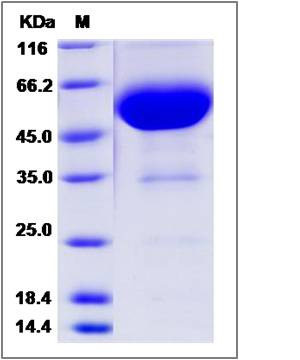Human CD47 Protein (Fc Tag)
IAP,MER6,OA3
- 100ug (NPP1169) Please inquiry
| Catalog Number | P12283-H02H |
|---|---|
| Organism Species | Human |
| Host | Human Cells |
| Synonyms | IAP,MER6,OA3 |
| Molecular Weight | The recombinant human CD47/Fc is a disulfide-linked homodimer. The reduced monomer comprises 362 amino acids and has a predicted molecular mass of 40.7 kDa. The apparent molecular mass of the protein is approximately 48-60 kDa in SDS-PAGE under reducing conditions. |
| predicted N | Gln 19 |
| SDS-PAGE |  |
| Purity | > 95 % as determined by SDS-PAGE |
| Protein Construction | A DNA sequence encoding the human CD47 (NP_942088.1) (Met1-Pro139) was expressed with the Fc region of human IgG1 at the C-terminus. |
| Bio-activity | 1. Measured by its binding ability in a functional ELISA. Immobilized human SIRPA-His (P11612-H08H) at 10 μg/ml (100 μl/well) can bind human CD47-Fc, The EC50 of human CD47-Fc is 10.1-23.5 ng/ml. 2. Measured by its binding ability in a functional ELISA. Immobilized mouse SIRPA-His (P50956-M08H) at 10 μg/ml (100 μl/well) can bind human CD47-Fc, The EC50 of human CD47-Fc is 0.05-0.13 μg/ml. 3. Measured by its binding ability in a functional ELISA. Immobilized human SIRPG-His (P11828-H08H) at 10 μg/ml (100 μl/well) can bind human CD47-Fc, The EC50 of human CD47-Fc is 0.58-1.34 μg/ml. |
| Research Area | Cancer |Cancer immunology |CD marker |
| Formulation | Lyophilized from sterile PBS, pH 7.4. 1. Normally 5 % - 8 % trehalose and mannitol are added as protectants before lyophilization. Specific concentrations are included in the hardcopy of COA. |
| Background | CD47 contains 1 Ig-like V-type (immunoglobulin-like) domain and is a receptor for the C-terminal cell binding domain of thrombospondin. It may play a role in membrane transport and signal transduction. CD47 is also a membrane protein, which is involved in the increase in intracellular calcium concentration that occurs upon cell adhesion to extracellular matrix. It is very broadly distributed on normal adult tissues, as well as ovarian tumors, being especially abundant in some epithelia and the brain. CD47 may play a role in membrane transport and/or integrin dependent signal transduction. It may prevent premature elimination of red blood cells. It also may be involved in membrane permeability changes induced following virus infection. By acting as an adhesion receptor for THBS1 on platelets, CD47 plays a role in both cell adhesion and in the modulation of integrins. It also plays an important role in memory formation and synaptic plasticity in the hippocampus. |
| Reference |
